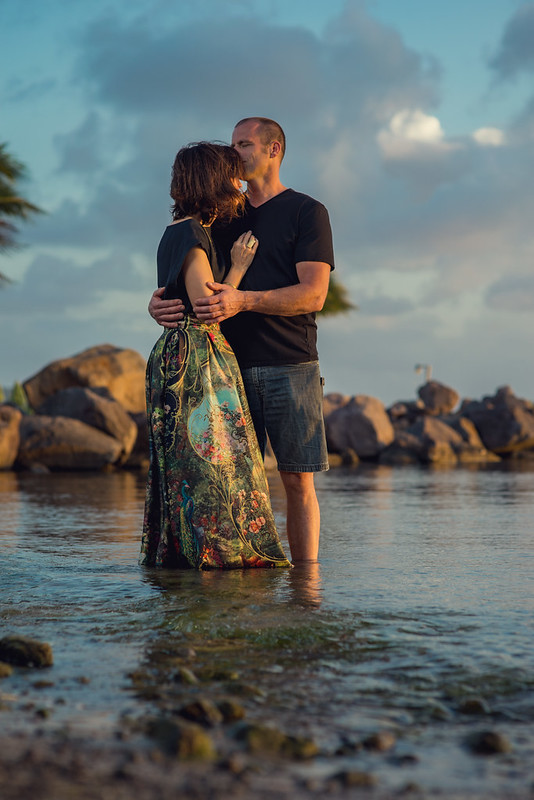God is love, but if we get it turned around, and make being loved into our god – we get lost in an ocean of grief.
Marriages are extremely fragile things, not an accomplishment to be proud of, but a miracle to be extremely thankful for.
Back on that day when we pledged forever love to each other, standing there at the altar, facing that Farm Boy with a ring in his pocket, I could glimpse Grandma out of the corner of my eye, sitting there in her sage-green dress on the other side of Dad, gently patting the arm of his gray suit, comforting her son, nodding at me, like she’s nudging me to go on, go on.
I looked up into Farm Boy’s eyes.
How much did my heart realize in that moment that to give your life to someone—Someone—is the work of a lifetime?
There is no easy way to give your life to someone.
Every wedding aisle is a narrow way.
Love is always the narrow way that limits one’s options — but expands and fulfills one’s soul. And to give your life to someone every day for the rest of your life means giving intentionally every day.





And then Farm Boy began to nervously recite vows that he’d written, that he memorized by heart, but he inadvertently stumbled on right at the beginning: “I give you this Ann, ring.”
Making your spouse your person is what can make your marriage happy.
Guests chuckled. Farm Boy closed his eyes and laughed with this endearing embarrassment. And all I wanted was to reach out and caress that cheek of his and say, “Come here.”
Every forever is made up of all the everydays.
In a humble chapel, the pews full of Dutch farmers with worn hands, sitting beside wives wrangling toddlers in laps, Pastor Dixon, with Albert Einstein hair and a handlebar mustache, was preaching a wedding sermon, but something sacred echoed, and it’s true: “Marriage is a sign of all things in heaven and on earth coming together in Christ,” wrote N. T. Wright. All the married are signposts.
This is what every marriage is: We are signposts pointing the way to the union that is forever and as real as feeling His fingers slip through yours and the palm that birthed the stars pressing warm against yours.




It was like he read my eyes. He stepped closer. And began again, like we always get to breathe deep and begin again.
And he vowed love that he’s promised to me again countless times over the last two and a half decades: “I promise to dig deep channels of communication the rest of my life between my soul and yours.”
All marriage vows are made by broken people who break promises, and this can break a heart, but this is always the mysterious way of marriage. Marriage breaks us and remakes us, and out of wreckage can come resurrection.
Promises made, and then we’d have to breathe life into them with our days. Two fresh-faced kids, but still we vowed, in essence, promises as holy-wind-wild as this — and we keep promising each other this, day after day:
There will certainly be an ocean of impossible that lies between us, and I promise to dig deep channels of communication between us, knowing the only way to dig deep channels of communication is with shards of a broken open heart.
There will certainly be life-ambushes that will press us up between a rock and a hard place, and I promise courage to break open my heart in vulnerability—so we can walk out into a deeper intimacy.
There will certainly be anxiety and stress, and in the midst, I promise to be careful, and care-full, and full of care with your heart—because giving your hand in marriage means handling another soul with the deepest care.
There will certainly be letdowns, and fallouts, and I promise to destroy shame and never you—because shame says things can never change.
Shame beats down and grace lifts up, and shame is a bully and grace is a shield, and cruciform love makes a way through.
There will certainly be wrong turns, yet I promise to live forgiveness because nothing else is life-giving.
Because forgiveness gives oxygen to the soul.
And no matter the days we feel like we’re lost in a wilderness, I promise to keep stumbling back to wear a habit of gratitude for you —because thanksgiving gives us a way out of entitlement and judgment and control management, and gratefulness makes for a greater life.
We don’t have any inkling of the shattering reality when we say those love vows.
All marriage vows are made by broken people who break promises, and this can break a heart, but this is always the mysterious way of marriage. Marriage breaks us and remakes us, and out of wreckage can come resurrection.
And there it was — at the beginning, the first vow was “I do.”
There always has to be a dying for there to be loving. Look at Love Himself.



Where two hearts repair a heartbreak by grafting together, they can be the strongest right there at the break.
And now — after all these years — the vow is simple and as profound and steadying as: “I’m here, right here.” After all these years, our scars now bear tender witness: Marriages are extremely fragile things, not an accomplishment to be proud of, but a miracle to be extremely thankful for.
And we know this grace-miracle now too: Where two hearts repair a heartbreak by grafting together, they can be the strongest right there at the break.
He; the one who knows all the edges of my story that bruise when touched, the places that are fractured and fraught, the spaces within me that ache tender with emptiness. He knows what shames me. He has seen all of me. And I don’t mean the sagging and the cellulite—I mean ugliness and spewed words that can’t be stuffed back into any bottle, sins that have marred and scarred long stretches of my soul—and his.
These days, our old eyes hold each other. There’s an old love that sees with a kind of holy double vision—that remembers a young lover in all their seeming infallibility, and sees your aged lover in all their beautiful humanity. This must be what it is to be naked and unashamed.
Passionate love is far more than falling in love. Passion literally means to suffer—which means: Lovers are the longsufferers. Which is to say its the old lovers who’ve suffered through much who are the most passionate of all.
We tell all the young kids, all our kids: Passionate love is far more than falling in love. Passion literally means to suffer—which means: Lovers are the longsufferers.
Which is to say its the old lovers who’ve suffered through much who are the most passionate of all.
It’s the old lovers who have suffered tenderly through crises and kids and the countless blur of days and untold heartaches, who live the most genuine nonstop passion. It’s the old lovers whose willingness to suffer for each other has made all their other suffering bearable. It’s the old lovers who have passionately suffered
long for each other, with each other, who have grown the most passionate, companionate love of all.
It’s the suffering, passionate, companionate love—the easy laughter and sure reliability and steadiness of companionship and friendship and withness—that makes for the happiest love of all.
And it’s the old love that is the most suggestive love of all because it suggests that the whole of us is actually seen and known, and we are still wholly loved. It is only in being really known, in ways that we wish nobody ever knew, that we ever really know what it means to be loved.
What could be more risqué than risking aging with someone and being worn down to your bare souls?



So I’ll take the boring love of decades of him helping with the dress zipper there at the nape of the neck, the sharing of the same table, and passing down the pitcher of water night after night, and then washing up the white everyday dishes and turning out the light because the truth is:
The real romantics are the boring ones—they simply let another heart bore down deep into their own, until the two become one.
The real romantics are the boring ones—they simply let another heart bore down deep into their own, until the two become one.
I could weep over the depth and beauty of old boring love like this.
Wholeness is falling in love with the same old sacred rhythms, the same old places, the same old miraculous people every day all over again. This is the way of Love Himself. The One who is Love can’t stop loving the same sun dancing across these same skies, day after day, can’t stop wooing this same world around in the same spinning choreography of moon and stars and space and infinite grace. It never grows old for Love Himself to keep falling in love with His same old loves.
Marriage is achingly hard and complicated and not all marriages last and there can be deeply good and holy reasons for this, and regardless of one’s marriage story, it’s always true: Marriage isn’t about always being happy—marriage is about always growing in the good direction. Life isn’t about avoiding trauma and suffering; life is about growing through it. And even the oldest love, the hardest days, can know slow growth, in our own singular ways, for those who have eyes to see.
Wholeness is falling in love with the same old sacred rhythms, the same old places, the same old miraculous people every day all over again.
Any ecosystem that remains always the same—never changes—is stagnant and dying. If a relationship isn’t changing, growing, even slowly—it’s dying. Pursuing an unchangeable state of happiness will lead you to a stagnant state of despair. Happiness-centered marriages implode—because that shifting center won’t hold. And honestly, there’s no such thing as unchanging happiness; happiness comes and goes like waves—and the only thing that is unchanging is change itself. And healthy relationships have a healthy relationship with waves, with the rising and falling, and trusting that there will still maybe be someway, another way, to rise.
The two become one to become stronger, to persevere and suffer and change and be sanctified and grow, rising to a new life together.



It is not the absence of infatuation that makes any marriage unhappy — but the absence of deep attachment.
This is the unspoken miracle of marriage: You vow to keep loving the same old person who keeps growing in their own way into a stranger. God knows, this is the deeper vow: “I’m here, right here.”
It is not the absence of infatuation that makes any marriage unhappy — but the absence of deep attachment.
After all these years, he and I are still settling into it: What turns a marriage, a life, around is choosing in a million small moments, instead of turning toward some distraction, some screen, some addiction, to turn toward the face of the other.
Making your spouse your person is what can make your marriage happy.
Falling in love is only the wild rush before the soft landing into a far deeper canyon of companionship through any pain and suffering that leads the actual way into real bliss.
The passion of the Christ is the ultimate passionate love; so stay in Christ… so there’s hope to stay in love.
All the young kids may not know it like the old ones do: Honeymoon love is an exhilarating part of it all, but it’s the staying loving that makes a love story.
I could weep and be wholly healed, for the reality of it:
The passion of the Christ is the ultimate passionate love; so stay in Christ… so there’s hope to stay in love.
My eyes don’t leave his. His don’t leave mine.
And all the old lovers keep sharing this kind of holy double vision… old hearts still lighting.
~Adapted excerpt from WayMaker, Find the Way to the Life You Always Dreamed Of

If you’re looking for the deep and realest love? Looking for a way to change all kinds of things? A new way for all kinds of stories? Looking for more than just a way through, but a new way of being?
For every person who is looking for a way through to real love, WayMaker is your sign.
Your sign that there is hope for real love, that there are miracles, and that everything you are trying to find a way to, is actually coming to meet you in ways far more fulfilling than you ever imagined.
Grab Your Copy of WayMaker — and begin the journey your heart’s longing for …







